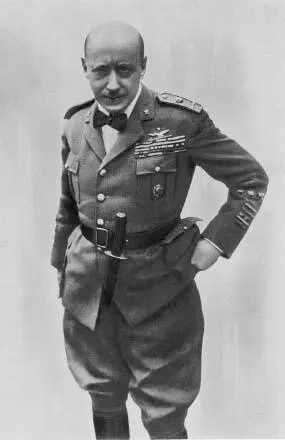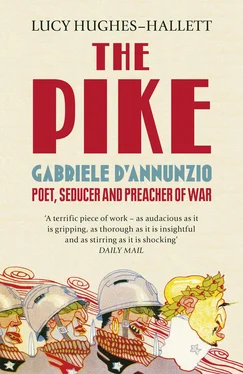1 ...6 7 8 10 11 12 ...39 Soon they will be having some sort of a sexual relationship (in their private encounters, as well as this public one, it is mostly a matter of d’Annunzio’s mouth and Rubinstein’s nether parts) and she will be playing the title role in his The Martyrdom of St Sebastian. The saint has long featured in d’Annunzio’s sexual fantasies. Now he converts them into a long, lush piece of music drama, with a score by his new friend Claude Debussy and designs – again – by Bakst. The Bishop of Paris forbids his flock to attend it. It is placed on the Papal Index of books no good Catholic may read.
March 1915. Since the outbreak of war, d’Annunzio, who believes only ‘a great conflict of the races’ can purge society of its decadence, has been calling from Paris for Italy to enter the war on the side of Britain and France (its ‘Latin Sister’). He is planning to return to Italy, but as he awaits his moment he accompanies the Italian journalist, Ugo Ojetti, to Reims, to see the venerable cathedral which went up in flames while under German occupation the previous September. Ojetti has obtained a pass, and a motor car. He stops off at the seventeenth-century hôtel particulier in the western Marais, where d’Annunzio has an apartment cluttered with oriental artefacts – a visitor has dubbed it ‘the House of the Hundred Buddhas’. A servant comes out first with several suitcases (d’Annunzio never travels light) and hampers full of food. Then d’Annunzio appears, ‘elegant and glossy as ever’, in an outfit which (unlike Ojetti’s suit and trilby) has a vaguely military air: his civilian status shames him. He is wearing a motoring cap, riding breeches with grey puttees, and a rich brown overcoat lined with curly yellow fox fur.
They drive through the ‘lunar landscape’ of the battlefields to Reims. Everywhere there are dead horses, their bellies inflated, their legs in the air. The great Gothic cathedral is roofless, its windows empty, its stones blackened. Guns are audible: they are not far from the front. D’Annunzio is silent and attentive. He picks up a shard of stained glass, a twisted strip of lead, a carved stone flower fallen from one of the pinnacles (all three will be on his desk at the time of his death twenty-three years later). He scrambles over sandbags to view the statues which he knows are there; he has been studying the guidebooks assiduously. He is making notes: ‘Pigeons fly up as though the wing of an angel had suddenly opened.’
This is his first visit to Reims but he has already written an account of the fire, each paragraph introduced with the lie ‘I saw …’. He knows what a potent image of German ‘vandalism’ the blackened ruin of the cathedral makes, and he understands how his own celebrity endorses it. His pseudo-eyewitness account was useful propaganda: it didn’t need to be true.
On the return journey – still, in that deathly landscape, the aesthete and poet – d’Annunzio notes how the road curves like the banderoles in mediaeval depictions of saints.
17 May 1915. Rome. The Capitol. D’Annunzio has returned after five years in France, re-energised. He is past fifty, but the most exciting period of his life is only just beginning. Europe is at war and he has found a new medium – the spoken word; a new persona – that of national hero; and a new mission – that of urging his compatriots to be great. Italy is still neutral. Ever since d’Annunzio arrived in the country twelve days ago he has been delivering oration after oration, each one more virulent in its contempt for the peace party, each one more bellicose.
Now he is speaking at the heart of ancient Rome to an already volatile crowd. D’Annunzio himself recalls the scene months later as he lies wounded: ‘Faces, faces, faces without number run past my bandaged eyes, like hot sand pouring through a fist. Is it not the Roman crowd, of that May evening on the Capitol? Enormous, rippling, howling?’
Fastidious to the point of neurosis, d’Annunzio has always been shudderingly preoccupied with dirt. Now he translates that private anxiety into political rage. In a virtuoso display of his immense vocabulary, he loads his speeches with synonyms for filth. The old order reeks and must be utterly destroyed. Cautious politicians are to be disposed of like rotten meat. ‘Sweep away all the filth! Into the sewer with all that is vile!’ Italy, its government, its entire political system, is dirty, foul, filthy, polluted, besmirched, sullied, soiled, stinking, fetid, contaminated, shitty, rancid, infected, diseased, putrid, rotten, corrupt, festering and defiled. He calls for a cauterisation by fire, a holocaust (a word he uses often), a great outpouring of blood to purge the stench of corruption.
He is beside himself. ‘I feel my own pale face burn like a white flame. There is nothing of me in me. I am as the demon of the tumult … Each of my words resounds beneath my cranium like the reverberation of curved metal.’
As his tirade reaches its climax he produces a prop, a sword which once belonged to Nino Bixio, the most aggressive of Garibaldi’s lieutenants.
‘I take it and draw it … I press my lips to the naked blade … I abandon my soul to delirium.’
The crowd weeps and howls. D’Annunzio thunders on. He is urging his listeners to ensure, by any means, up to and including murder, that the appeasers should not be allowed to take their seats in parliament again. ‘Make out lists. Proscribe them. Be pitiless. You have the right.’
His speech triggers a riot. Hundreds of people are arrested. One of them is Marinetti, who has declared in his ‘Futurist Manifesto’ that he would celebrate ‘the multicoloured, polyphonic tides of revolution in the modern capital’. Another is a magazine editor named Benito Mussolini.
One week later Prime Minister Salandra declares that Italy is at war.
August 1917. War. As a roving ‘liaison officer’ d’Annunzio has been on night manoeuvres on board warships in the Adriatic, and has been down in a submarine. He has been repeatedly under fire in the terrible battles in the mountains and along the River Timavo, and he has flown repeatedly. He has survived a plane crash after which he had to lie motionless in a darkened room for months, and which has left him blind in one eye. Even Ernest Hemingway, who can’t stand his high-faluting rhetoric, grants that he has been ‘divinely brave’.

This is d’Annunzio’s account of a mission flown in pursuit of Austrian troops in the Slovenian mountains. He is now in command of a squadron of fighter planes. The letter is to his latest lover, mistress of one of Venice’s great palaces, whom he calls Venturina because her gold-flecked, tawny eyes remind him of one of the colours used by the Murano glass-makers (he is a discriminating collector of glass): ‘I think Venturina will be pleased with her friend. It was an inferno of fire. I went down to 150 metres over the enemy infantry in order to machine-gun them. I could make out their uniforms, and the flap of canvas they wear hanging down the back of their necks to keep off the sun … Miracle! A bullet heading for my head hit the bar at the back of the cockpit, and rebounded. I heard the clear ping it made, and turned round. The steel bar was dented. Another bullet passed through the canvas between my legs. Innumerable others have made holes in the wings, splintered the propellers, snapped the cords. And we are unharmed!’
Twelve days earlier, d’Annunzio, ever attentive to the ritual of warfare, has taught his squadron a new battle cry. Instead of the ‘Ip, Ip, Ip, Urrah!’ which he finds crude and barbarous, he has ordered them to shout the Greek: ‘Eia, Eia, Eia, Alalà!’ It is, he claims, the battle yell of Achilles. He has found it in Aeschylus and Pindar. He has used it in his plays. Now he is demanding that the men under his command give the shout standing upright in the cockpits of their flimsy little wood and canvas planes.
Читать дальше













